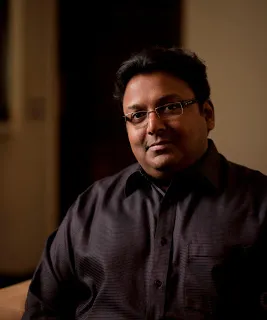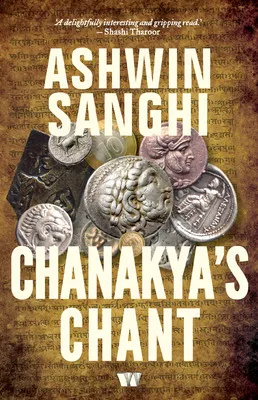In conversation with author and entrepreneur Ashwin Sanghi: on his views on startups, failure and his personal life
Ashwin Sanghi is an entrepreneur by day and an author by night. Ashwin wrote his first novel “The Rozabal Line” under the pen name of Shawn Haigins, but decided to take his place under the spotlight, with his best selling novel “Chanakya’s Chant”. YourStory caught up with him to discuss his views on entrepreneurship and the startup space in India.

Ashwin says it is important to have a holistic view on entrepreneurship. “I would not scurry like every other speaker into the opportunities, youth and education system. The startup ecosystem or for that sake entrepreneurship is a chain of factors. Let me take you through each of the link one by one,” he says.Entrepreneurship is the freedom to use one’s knowledge to the best of ability. However, the first link (i.e. knowledge) has always been a weak factor, ofcourse with some exception. And our education system is to be blamed for this mishap. After completing his bachelors from St. Xaviers College, Bombay, Ashwin went to Yale University for further studies and there he observed the difference in the education sector of both countries. “The apathy and lack of amenability to change in education in India has forced goliaths like Infosys, Wipro and Reliance to start their own universities. Why are they doing so? Students, after graduation have to be retrained so that they can have the core skills needed on the job. If that is the need of day, why not train them from their very threshold into the higher education world. These institutes, opened by the corporates emphasize on vocational training and that is where precisely my message lies,” says the author - entrepreneur. Students, inspiring to be entrepreneurs, should ask themselves: Am I erudite enough on any subject? When the answer starts tilting towards yes, he has led a successful college life, irrespective of his marks and degree.
After technical knowledge, ethics and morality are the other aspects he considers important -- both to learn and espouse in business. “Indian businessmen have traditionally known to be amassing wealth via cornering of real estate, regulation arbitrage, and appropriation of natural resources. However, my experience of young business heroes (I really believe them to be the heroes of Indian growth story) have been positively surprising. They aspire to earn money but only in the right way,” says Ashwin. Sparing ennui lectures, he always asks them two simple questions, “Will you be able to live with consequences of any venal decisions? Is money more important to sleeping peacefully at night?” Once they are able to answer these questions, decision-making becomes rather easy for them, says Ashwin.

While the above two qualities help make a successful citizen, it is the spirit and passion for doing something inspite of failures and risks that makes the clique of entrepreneurs so special. Ashwin narrates an example. “I knew a young waiter attached to a restaurant, who would regularly serve me when he went there for dinner. Some time later, I got to know that he had left in order to start providing party services. I tried him out and found him to be rather good. He would always provide me with discounted rates in return for a couple of referrals. Today he runs a large catering service with establishments in multiple cities and has a huge top line. I account for an insignificant portion of his business and that makes me very happy indeed. For those who were not fortunate enough to receive high quality education, doing work in the best possible way can be the true path to knowledge. After all, Dhirubhai Ambani who once worked at a petrol pump, went to build one of world’s largest oil refineries.”Entrepreneurship in India, long before VCs and incubators came into picture was the alter ego of failure. However failure has started effacing after some spectacular turnarounds from Indian pied pipers. Ashwin says he is himself an example of failure turned success. When he’d just returned from US in 1993 after an MBA, Ashwin was put in charge of an industrial unit that was sick. His mandate was to turn it around (For those who only know Ashwin as an author, he also works for MK Sanghi group that has business interests in automobile, real estate and industrial gases). Ashwin struggled for two years before realizing it was not going nowhere. In 2000, Ashwin set up India’s first automobile purchasing car portal but went belly-up with the dotcom bust. His first novel, The Rozabal Line, was not a commercial success and it was only two years later that he got rewarded with Chanakya’s Chant. “My greatest learning has happened from my failures. I know it sounds shop-soiled but it’s a fact. The only real failure in life is not learning from one’s failures,” he says.
For wannabe entrepreneurs, puffed with such feelings and spirit, what remains is to find lacuna in existent system and his plank for success. There are two types of innovation, says Ashwin -- one lies in the uniqueness of idea and invention, while the other lies in solving a common problem in a very effective manner. And for most people, the best way to build a successful business is to take up the second way. For instance, What is RedBus, an efficacious solution to the lack of an integrated transport solution.
Towards to the end of the conversation, Ashwin offers a piece of his mind to wishful authors. “Authors are entrepreneurs as much as anyone else. The publishing industry is notorious for rejection and several good writers shy away from the market because of initial negativity. If you really think about it, one goes through the same process of trial by fire when one is establishing a startup. The key piece of advice is to simply keep at it. Bestsellers are not created by simply being a good writer. They are created by good writers who are notoriously thick-skinned,” says Ashwin.
Website: http://ashwinsanghi.com







